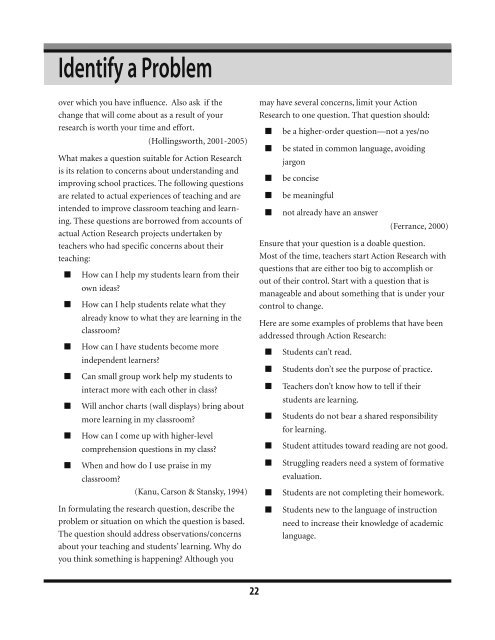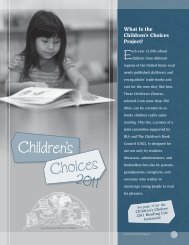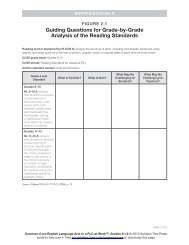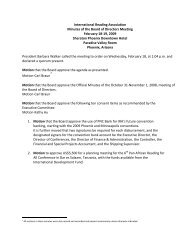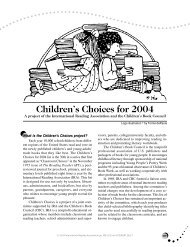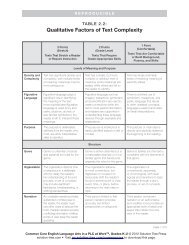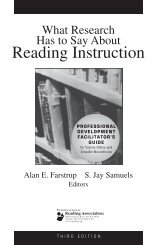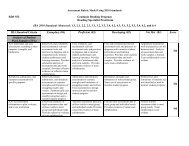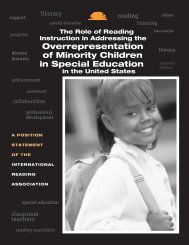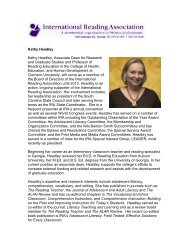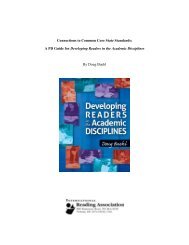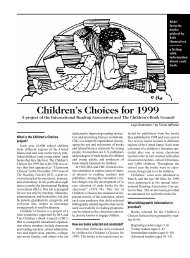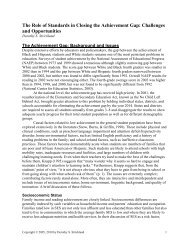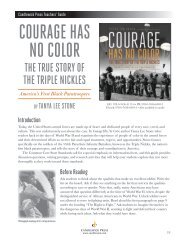A Practical Guide to Action Research for Literacy Educators
A Practical Guide to Action Research for Literacy Educators
A Practical Guide to Action Research for Literacy Educators
You also want an ePaper? Increase the reach of your titles
YUMPU automatically turns print PDFs into web optimized ePapers that Google loves.
Identify a Problem<br />
over which you have influence. Also ask if the<br />
change that will come about as a result of your<br />
research is worth your time and ef<strong>for</strong>t.<br />
(Hollingsworth, 2001-2005)<br />
What makes a question suitable <strong>for</strong> <strong>Action</strong> <strong>Research</strong><br />
is its relation <strong>to</strong> concerns about understanding and<br />
improving school practices. The following questions<br />
are related <strong>to</strong> actual experiences of teaching and are<br />
intended <strong>to</strong> improve classroom teaching and learning.<br />
These questions are borrowed from accounts of<br />
actual <strong>Action</strong> <strong>Research</strong> projects undertaken by<br />
teachers who had specific concerns about their<br />
teaching:<br />
■<br />
■<br />
■<br />
■<br />
■<br />
■<br />
■<br />
How can I help my students learn from their<br />
own ideas?<br />
How can I help students relate what they<br />
already know <strong>to</strong> what they are learning in the<br />
classroom?<br />
How can I have students become more<br />
independent learners?<br />
Can small group work help my students <strong>to</strong><br />
interact more with each other in class?<br />
Will anchor charts (wall displays) bring about<br />
more learning in my classroom?<br />
How can I come up with higher-level<br />
comprehension questions in my class?<br />
When and how do I use praise in my<br />
classroom?<br />
(Kanu, Carson & Stansky, 1994)<br />
may have several concerns, limit your <strong>Action</strong><br />
<strong>Research</strong> <strong>to</strong> one question. That question should:<br />
■<br />
■<br />
■<br />
■<br />
■<br />
be a higher-order question—not a yes/no<br />
be stated in common language, avoiding<br />
jargon<br />
be concise<br />
be meaningful<br />
not already have an answer<br />
(Ferrance, 2000)<br />
Ensure that your question is a doable question.<br />
Most of the time, teachers start <strong>Action</strong> <strong>Research</strong> with<br />
questions that are either <strong>to</strong>o big <strong>to</strong> accomplish or<br />
out of their control. Start with a question that is<br />
manageable and about something that is under your<br />
control <strong>to</strong> change.<br />
Here are some examples of problems that have been<br />
addressed through <strong>Action</strong> <strong>Research</strong>:<br />
■<br />
■<br />
■<br />
■<br />
■<br />
■<br />
■<br />
Students can’t read.<br />
Students don’t see the purpose of practice.<br />
Teachers don’t know how <strong>to</strong> tell if their<br />
students are learning.<br />
Students do not bear a shared responsibility<br />
<strong>for</strong> learning.<br />
Student attitudes <strong>to</strong>ward reading are not good.<br />
Struggling readers need a system of <strong>for</strong>mative<br />
evaluation.<br />
Students are not completing their homework.<br />
In <strong>for</strong>mulating the research question, describe the<br />
problem or situation on which the question is based.<br />
The question should address observations/concerns<br />
about your teaching and students’ learning. Why do<br />
you think something is happening? Although you<br />
■<br />
Students new <strong>to</strong> the language of instruction<br />
need <strong>to</strong> increase their knowledge of academic<br />
language.<br />
22


